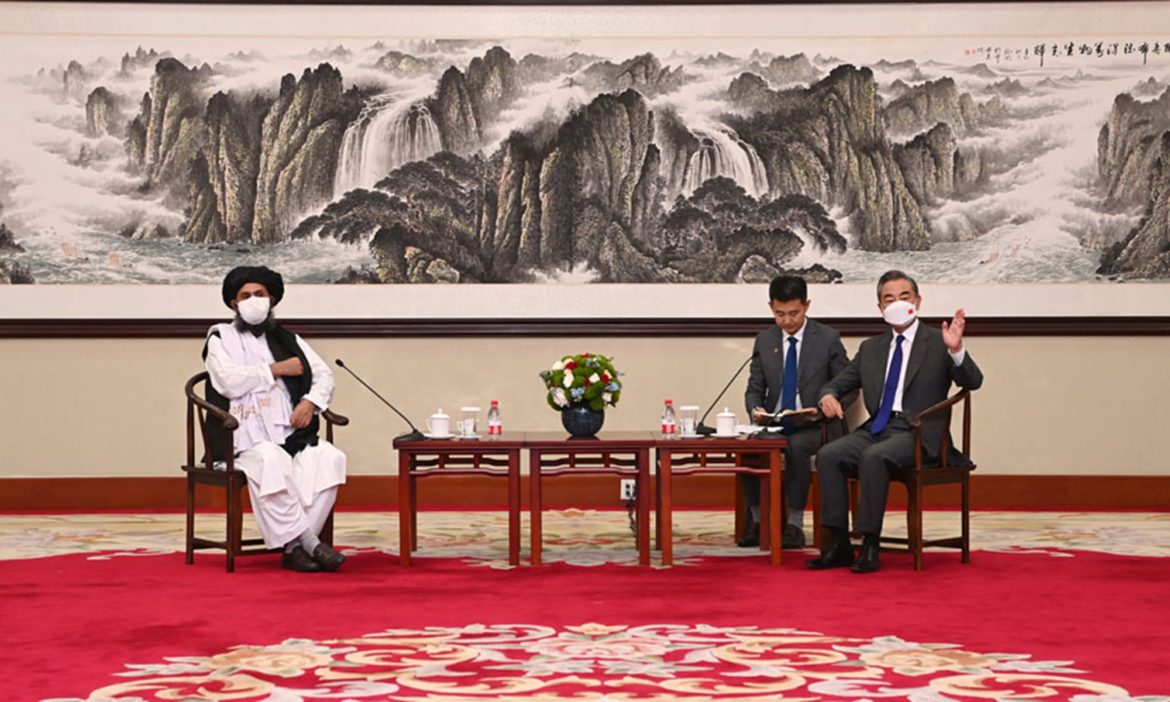By Safiye Ergun
This editorial aims to explain China and Taliban relations with the current developments happening in Afghanistan – the capital Kabul is taken over by Taliban on the 15th July. Compiled from various news sources, this article raised two basic questions: what China aims and what Taliban gains. After answering them, the article will direct you to the details of the subject.
What China aims? China’s two biggest goals regarding the Taliban are (i) preventing any damages to the projects under the Belt and Road Initiative in the region and (ii) spreading the instability in Afghanistan to the Xinjiang Autonomous Region. With the promises of the Taliban authorities to the Chinese side on these issues, China gave positive signals to the Taliban. It can be said that another aim of China is (iii) damaging the image of the U.S., which left the country to its own fate by withdrawing from Afghanistan. Finally, (iv) Afghanistan’s soil is rich in rare elements and various energy sources, making it attractive for China.
What Taliban gains? The main purpose of the Taliban for negotiating with other states is, of course, gaining legitimacy. Because no formation that has not gained international recognition has the status of a state.
Process of the meetings and comments:
In late July, China’s Foreign Minister Wang Yi hosted Taliban leaders, including Mullah Abdul Ghani Baradar, in Tianjin. At that meeting, the Taliban tried to persuade Wang that they do not pose any threats to China’s interests. “The Afghan Taliban will never allow any force to use the Afghan territory to engage in acts detrimental to China,” Baradar said; and he added: “The Afghan Taliban believes that Afghanistan should develop friendly relations with neighboring countries and the international community.” “He even invited China to ‘be more involved in Afghanistan’s peace and reconciliation process and play a bigger role in future reconstruction and economic development.’”
Chinese foreign ministry spokeswoman Hua Chunying said on July 16, 2021 that China “respects the wishes and choices of the Afghan people” and hoped the Taliban’s declarations would transition the country under an “open, inclusive Islamic government” and ensure the safety of Afghan citizens and foreign missions would be carried out accordingly. She added:
“China expects these statements to be implemented to ensure the situation in Afghanistan achieves a smooth transition, curbs all kinds of terrorist and criminal activities, and allows the Afghan people to be far away from war and to rebuild their beautiful homeland.”
The speech of Hua Chunying also included Beijing’s will to pursue a constructive role in establishing “peace and reconstruction” in Afghanistan. Her statement turned attention to China’s interests in Afghanistan. There is a potential for copper and gold, since Afghanistan holds an estimated 1.4 million tons of rare earth elements (REEs), and minerals that are crucial for the production of renewable energy technology as well. This makes Afghanistan a prime target of investment for China – the current king of global REEs supply chains.
The Chinese-Taliban rapprochement is a surprising development and is viewed by most commentators as rather strange. Because, there are still rumors in China, which is ruled by an atheist regime – the Chinese Communist Party has set up concentration camps against Muslims, especially in the Xinjiang Autonomous Region. On the other hand, the Taliban has always been on the agenda with its religious fundamentalist structure. In addition, Beijing has long linked the Taliban with the East Turkestan Islamic Movement, which it has blamed for terrorist attacks in Xinjiang. The coming together of these two opposite attitudes was found surprising by the public. Jon B. Alterman, director of the Center for Strategic & International Studies’ Middle East Program, told that: “For China, Afghanistan has a few opportunities and a lot of perils, and I’d expect China to pursue a policy with absolutely no illusions.”
In other respects, China has been using the withdrawal of the US from Afghanistan as a propaganda tool and advertising this as a big U.S. failure. As Robert Mogielnicki – a senior resident scholar at the Arab Gulf States Institute in Washington and an adjunct assistant professor at Georgetown University, expressed:
“Chinese officials will seize this opportunity to portray U.S. involvement in Afghanistan as a dismal failure and pitch the Chinese model of global leadership for the country’s forthcoming chapter.”
Another issue that China uses as a propaganda tool against the U.S. regarding this issue is Taiwan. (read for detail)
On July 19, 2021, Hua Chunying spoke at a press conference and announced that Beijing still continues contact with the Taliban. She expressed China’s posture toward the Taliban with those words:
“(…) Some repeatedly stress distrust of the Taliban, but what I want to say is nothing in the world can stand still. I prefer to look at things dialectically, to see its past and present, and its words as well as actions. (…) You won’t be able to draw practical conclusions if you don’t keep pace with the times and only keep a conservative and fixed mindset and ignore the development of the situation.”
Although there is no official statement by the Chinese government that they officially recognize the Taliban, all these positive developments between the two indicate that this news will come soon.

